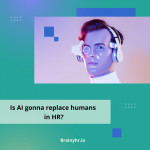The role of HR departments in an enterprise is extremely important. This is where key employee decisions are made. And not only in terms of their employment, keeping personal documentation, recording working time and calculating salaries, but also organising training courses or ensuring the right atmosphere at work.
All these activities are extremely time-consuming and require the use of appropriate procedures. Therefore, in the past, HR departments produced countless documents and their traditional circulation could be a headache. Digital technologies and information systems have changed everything. Electronic management of HR processes, through automation and the introduction of electronic document flow, has effectively improved all activities related to human resources. How does it look in practice? Let's start with the general HRIS feature.
What is HRIS?
HRIS provides features that support the HR department in a wide range of tasks, from onboarding employees to managing the organisation in general. HRIS will support both HR managers as well as employees, managers, new hires and long-term team members.
HRIS allows the company to plan personnel costs more effectively and leads to increased efficiency in making decisions in the field of HR.
What are the benefits of HRIS?
With the help of HR you can track changes in everything that is related to employees: attendance, raises, positions held, training, etc. The second issue is compliance with the regulations. This includes identification material for employees in the event of misconduct, first contact information in the event of an accident, citizen identification information for the tax office, and certificates. Another reason is efficiency. Having all of this information in one place not only helps increase accuracy but also saves time. One final benefit is the ability to offer self-service HR for staff and managers. This allows employees to manage their own affairs.
HR Analytics
HR Analytics is analysing the problems of an organisation in the area of human resources, data processing and drawing conclusions for the future. For example, can you answer questions about your organisation?
- What are the company headcounts?
- What percentages of hired vs left employees in your company?
- Do you know which employees are likely to leave the company in the next year?
You can answer these questions only using data from the resources of HRIS systems. Most well-functioning HR departments will easily answer the first question. The answer to the second question is more difficult. To answer them, you must use a combination of at least two data sources.
In order to answer the third question, it is already necessary to analyse data from various sources that are in the resources of HR departments, but sometimes also in sales or controlling.
Over the years, HR departments have been collecting and collecting enormous amounts of employee data, but this data is often unused. As soon as HR learns to analyse the data it has, we can talk about engaging in real analytics as soon as possible.
How HR Analytics helps you manage your human resources
Just as marketing analyzes have changed marketing, HR Analytics changes the area of personnel management and allows for:
- making better decisions using data
- checking the effectiveness of actions taken
- shifting the burden of HR activities from operational to tactical and strategic importance for the company.
Thanks to data analysis, we can predict which new hires will be our best employees in 1-2 years, and which will leave our company within a year. Having such information, you can easily change your procedures and decisions in the scope of the recruitment and selection system to the right ones - more effective.
What does an HRIS analyst do?
An HRIS analyst is someone who manages a human resource information system. The responsibility of an HRIS analyst is to collect data and provide it to other people in the company in the form of reports and recommendations. Compiled data generally covers employee performance, attendance records, and information on pay and workforce development. Organising and properly presenting all aspects of the HR function is very important to your success as an HRIS Analyst.
Summary
HR systems allow companies to effectively manage all the most important HR processes, communicate with employees and allow for self-service. By supporting teams in many projects and automating routine processes, managing people becomes less time-consuming, generates lower costs and allows us to effectively reduce office papermaking.
HR systems are no longer just the domain of corporations and companies with an extensive structure, they also work well in smaller organisations, even if only a few employees are to use them.


 Posted on Feb 21, 2022 by Brainy HR
Posted on Feb 21, 2022 by Brainy HR


